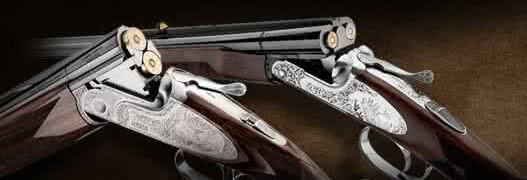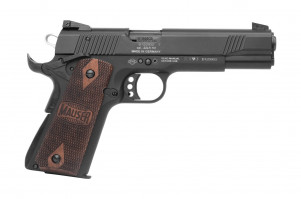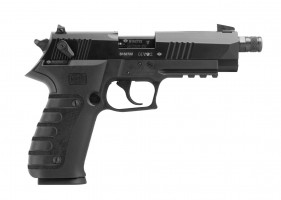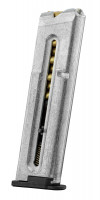1-10 on 10 Products

Mauser Waffenfabrik, commonly called Mauser, is a German arms manufacturing company, based in Oberndorf am Neckar. The full company name today is Mauser-Werke Oberndorf Waffensysteme GmbH.
The firm supplied several models of rifles and pistols to the German army as well as the civilian market during the 19th and 20th centuries. The bolt system of the Model 98 rifle is still very often used on big game hunting rifles. Among the company's most famous Mauser pistols are the Mauser C96 and Mauser M712 Schnellfeuer.
| SKU | Designation | French Law | MSRP |
|---|---|---|---|
| GMA2911 | Mauser 1911 cal.22 | B |
469 € incl. tax
|
| SKU | Designation | French Law | MSRP |
|---|---|---|---|
| GMA221 | Mauser M20 Black cal.22 threaded | B |
449 € incl. tax
|
Mauser 1911 Competition Set .22lr HV Semi-Automatic Pistol
 Mauser
Mauser

Out of stock
774.00 € TTC
SKU GMA2912
| SKU | Designation | French Law | MSRP |
|---|---|---|---|
| GMA2912 | 1911 .22 LR | B |
774 € incl. tax
|
| SKU | Designation | French Law | MSRP |
|---|---|---|---|
| GMA0072 | Wooden stock | B |
479 € incl. tax
|
| SKU | Designation | French Law | MSRP |
|---|---|---|---|
| GMA007 | PP7 Black .22LR | B |
429 € incl. tax
|
| SKU | Designation | French Law | MSRP |
|---|---|---|---|
| GMA9151 | Chargeur Mauser M15 Tac OP cal.22 black 22 coups | B |
60 € incl. tax
|
| SKU | Designation | French Law | MSRP |
|---|---|---|---|
| GMA9920 | Mauser M20 Black pistol magazine cal.22 | B |
60 € incl. tax
|
| SKU | Designation | French Law | MSRP |
|---|---|---|---|
| GMA9911 | !B! Chargeur pistolet Mauser 1911 cal.22 - 10 coups | B |
60 € incl. tax
|
Mauser 1911 pistol silencer adapter 1/2x28 thread
 Mauser
Mauser
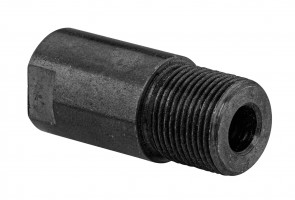
Out of stock
From
29.00 € TTC
SKU GMA89112 / GMA89111
| SKU | Designation | French Law | MSRP |
|---|---|---|---|
| GMA89112 | Adaptateur silencieux pistolet Mauser 1911 filetage 1/2x28 | B |
29 € incl. tax
|
| GMA89111 | B |
29 € incl. tax
|
| SKU | Designation | French Law | MSRP |
|---|---|---|---|
| GMA9923 | !B! Chargeur pistolet Mauser HSr / PPK Black cal.22 GSG | B |
60 € incl. tax
|
1-10 on 10 Products
About Mauser
The royal arms factory of Oberndorf was created on July 31, 1811 by Frederick I of Württemberg; the following year, it already employed 133 workers. Wilhelm and Paul Mauser designed there in 1867, a first rifle loaded by a rotating breech, based on the French Chassepot, itself inspired by earlier Prussian rifles. The Franco-Prussian War of 1870 having demonstrated the superiority of the French rifle, their most recent model, the Gewehr 71 (model 1871 rifle) was selected by the new German army, as an orderly rifle, despite competition from the Bavarian rifle. Werder M1869. Production begins in Oberndorf; three models firing an 11 × 60 mm cartridge are manufactured: a standard infantry rifle with a long barrel of 850 mm, a carbine for Jäger (hunters, light troops) with a barrel length of 700 mm and another of cavalry whose barrel is only 500 mm long. Furthermore, Serbia produces, under license, an improved version of the weapon in 10.15 mm caliber, the Mauser-Milovanovich M1878/80. In 1886, the French army adopted the Lebel model 1886, using a lower caliber cartridge including smokeless powder, and other countries would soon try to do the same. Germany created a repeating rifle, without the help of Paul Mauser this time, but using for the first time cartridges with cylindrical walls and restricted necks: the 7.92 × 57 was born, and all rifle ammunition produced since then are only derivatives. The following year, the Italian Vetterli-Vitali introduced power supply via a magazine box, more reliable and allowing a higher rate of fire. The German army adopted these two innovations with the Mannlicher Modell 1888 rifle, which fired a new cartridge, the 7.92 × 57 mm. Paul Mauser also worked on repeating rifles, he developed an extractor system, but, having difficulties with magazine boxes, he used tubular magazines under the barrel. His Gewehr 92 was not a great success, because he lost the competition from the American army to the Krag-Jørgensen; only four hundred examples of the carbine version were sold to the Spanish Navy. The first foreign orders arrived with the Mauser 1889 (Belgium), Mauser 1890 (Ottoman Empire) and Mauser 1891 (Argentina). Success came with the Gewehr 93 model, which, with its vertical magazine of five cartridges of caliber 7 × 57 mm (known more familiarly as the 7 mm Mauser), became the regulatory rifle in Spain and many Latin American countries. The Battle of San Juan saw 750 Spanish regulars keep 15,000 Americans armed with Krag-Jørgensen at bay for twelve hours. This event appears to have played a role in the United States acquiring the license for the Mauser breech bolt and its use in their Springfield M1903 rifle. The battle also had a very beneficial effect on the German firm's sales. Turkey also purchased the Gewehr 93 and Brazil the Gewehr 94. The next model, the Gewehr 1895, had even more resounding successes, Mexico, Chile, Uruguay, China, Iran, Serbia ( Mauser 99) and the Boers adopted it. Finally Sweden and Luxembourg chose the Gewehr 96 (a direct evolution of the Modell 1894). During the Mexican Revolution, Emiliano Zapata said he could count on 70,000 men armed with Mauser rifles. Paul Mauser was also interested in the semi-automatic pistol and his Mauser C96 was also a great commercial success. Faced with this success, control of the factory was ceded to the Mauser brothers and it became Waffenfabrik Mauser AG. To complete the picture, it remains to obtain the juiciest market, the equipment of the German army. The Gewehr 98 won this market in 1898; the rifle and its derivative the Karabiner 98k became the standard rifles of the Heer until 1945. But in 1941, the prototype semi-automatic rifle intended to take over proved completely unsuitable for use in the field, and , after a small production, it was supplanted by its rival the Walther G43. After World War II With the fall of the Third Reich, the occupation of Oberndorf was handed over to French troops. On the orders of a local official, the factory was then dismantled and the archives destroyed. Edmund Heckler, Theodor Koch and Alex Seidel, former Mauser engineers, then formed the Heckler & Koch company, which became the main supplier of small arms to the German army. The Mauser firm still exists and, having become a subsidiary of Rheinmetall, it produces autocannons, such as the Mauser BK-27 which equips the Eurofighter Typhoon combat aircraft. However, the branch that produces civilian rifles was separated from the rest of the company in 1999. It now bears the name "Mauser Jagdwaffen GmbH", and is headquartered in Isny/Allgäu. It only produces rifles for hunting, including the M98 and M98 Magnum which are again manufactured identically to their original versions. On the civilian market, Mauser rifles and their derivatives were and are often used for big game hunting, particularly in Africa, sometimes using very large caliber ammunition such as .9.5x57 cal .416 cal .500 cal (12.7mm). Among manufacturers of this type, we find, for example, John Rigby (en), Česká zbrojovka as, SIG Sauer or Zastava Arms.
In France products of categories A, B, C or D are subject to rules of purchase, port, transport and detention. For more details please consult the link below.
Classification of weapons according to the French Internal Security Code
Classification of weapons according to the French Internal Security Code
The recommended retail prices are listed as a guide..
Within the limit of stocks
Pictures are not contractual. Photos of product may be different with the final products.
Texts, brands and characteristics are not contractual as they are liable to change depending on arrivals.
